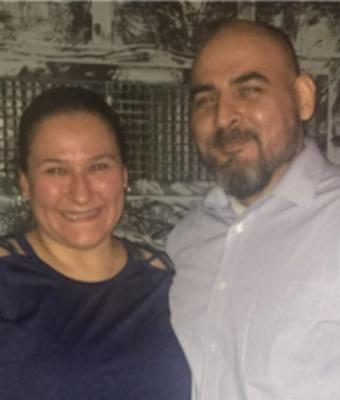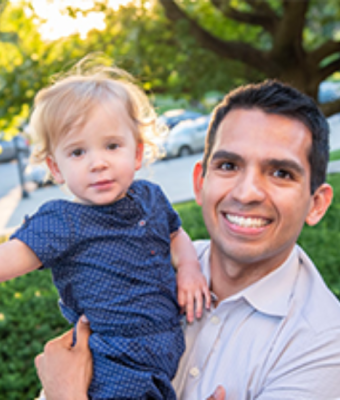Hispanic and Latino Community & Parkinson’s
💡 Quick Summary
-
Hispanic and Latino people with Parkinson’s often face healthcare disparities, faster disability progression, higher risk of cognitive changes and underrepresentation in research.
-
Early diagnosis, working with a PD specialist, maintaining an exercise routine, managing medications and addressing mental health can improve quality of life.
-
Participation in research, including PD GENEration, access to Spanish-language resources and family involvement help empower the Hispanic and Latino PD community.

Hispanic and Latino members of the Parkinson’s disease (PD) community often face distinct barriers to living well with Parkinson’s. Understanding these challenges can help empower you to advocate for the care you deserve.
Those who identify as Hispanic and Latino come from a wide range of culturally and socially diverse backgrounds, from a multitude of nations. Hispanic and Latino people living with a Parkinson’s diagnosis are underrepresented in research. They are also more likely to experience gaps in healthcare access and coverage, faster disability progression, greater possibility of cognitive (thinking) changes and worse quality of life.
The Parkinson’s Foundation acknowledges and brings awareness to these disparities for the Hispanic and Latino PD community. We work to make quality healthcare more accessible to everyone with Parkinson's.
Information That Can Empower
Though the 2022 U.S. census shows Hispanic and Latino people make up nearly 20% of the country’s population (63.6 million people), members of this community are underrepresented when it comes to Parkinson’s research. Some available study findings as they relate to Hispanic and Latino people with Parkinson’s include:
While symptoms and disease progression are unique to each person, a 2023 study examined rural areas in California to reveal higher diagnosis numbers of young-onset Parkinson’s disease (YOPD) and worse movement and non-movement symptoms in Hispanic and Latino people. The same study found that they did not receive adequate care compared to white non-Hispanic and Latino people (Duarte Folle et al., 2023).
Parkinson’s symptoms result from the brain’s inability to produce the chemical dopamine. Many PD medicines, called dopaminergic therapies, either temporarily replenish dopamine or mimic its action. One study found below average management of dopaminergic therapies in Hispanic and Latino people with PD.
Work with your doctor to develop a tailored treatment plan. Parkinson’s medications work best when they are taken on time, every time.
Another study explored existing research on variations in PD symptoms in different ethnic groups and responses to treatment. The study found that Hispanic, Latino and Black people seem to be at a higher risk for Parkinson’s-related cognitive impairment. However, the reasons, whether due to health or genetic factors or healthcare disparities, remain unknown.
While there is no cure for Parkinson’s, research shows that regular exercise can boost cognitive function in PD and improve some symptoms. Establishing an exercise routine soon after diagnosis is essential.
In a 2023 study of people who enrolled in the Fox Insight online study — including 1,161 Hispanic and Latino people and more than 24,000 White, non-Hispanic and Latino people — Hispanic and Latino participants reported greater depression and worse health-related well-being.
Depression is a common PD symptom that is often treatable. It’s important to take depression seriously, talk to your doctor about symptoms and treatment options.
Financial barriers, less access to high-quality healthcare, lack of health insurance and communication difficulties for people who need a Spanish-speaking doctor can all complicate healthcare for Hispanic and Latino people.
-
If you need help finding a Parkinson’s specialist, local educational and exercise classes, call our Helpline at 1-800-4PD-INFO (1-800-473-4636). Our Helpline specialists can answer your PD questions in English and Spanish.
-
If you need help navigating healthcare, contact the National Hispanic Family Health Helpline, Su Familia, at 1-866-783-2645. Operated by the National Alliance for Hispanic Health, this bilingual service offers confidential, free health information in Spanish and English.
Stories from the Community



Parkinson's & Genetics
Genetics cause about 10% to 15% of all Parkinson's. Scientists generally agree that a combination of genetic and environmental factors, such as head injury or exposure to chemicals or toxins, cause PD.
Until recently, the only PD genome-wide association studies (GWAS) genetic included people of European and East Asian ancestry. However, authors of an innovative 2021 study in the Annals of Neurology, examined the first-ever GWAS of Latinos with PD. These studies are designed to pinpoint links between common genetic variants and risk for specific diseases.
Along with many investigators across Latin America, study author Ignacio Mata, PhD, of the Cleveland Clinic, a member of the Parkinson’s Foundation Global Care Network, leveraged data from the Latin American Research Consortium on the Genetics of Parkinson’s Disease (LARGE-PD) — the world’s largest PD case-control group of Latinos. The researchers discovered that the PD-related SNCA gene was found to be significantly associated to PD risk in the Latino population.
Researchers also found several novel genetic regions of possible importance that could not be replicated, due to the limited number of study participants.
How to Advocate for Better Parkinson’s Care
The more you know about living with Parkinson’s, the better you can steer your care:
-
Choose a doctor who answers your questions, treats you with respect and makes you comfortable. When possible, seek out a neurologist with additional training in movement disorders to guide your Parkinson’s care. These specialists can often recommend other healthcare providers to your PD team who may be helpful with day-to-day challenges.
-
Commit to an exercise routine, work with your doctor to find the right medications and take an active role in your PD symptom management to maintain independence and mobility.
-
Take care of your mental health. At least 50% of people experience depression in PD and nearly 40% experience an anxiety disorder. Treating depression is one of the most significant ways to improve quality of life. Seeking support when you experience mood changes can also boost your cognitive well-being.
-
Include your spouse and family members in discussions with your doctor. Parkinson’s is a family affair: everyone in your family is affected. Adult children often want to help, but do not know how to begin.
-
Ask your healthcare provider if they are up to date with the latest research opportunities and whether you might qualify to participate.
-
Help further Parkinson’s research. Consider enrolling in PD GENEration: Powered by the Parkinson’s Foundation in English or Spanish.
If you feel more comfortable speaking and reading information in Spanish:
- Advocate for yourself. Request educational materials in Spanish from your doctors.
- Contact your healthcare provider prior to your appointment and ask them to supply an interpreter.
- Visit the Spanish-language section at Parkinson.org/Espanol.
- Contact our Spanish-speaking Helpline specialists for PD referrals and local resources.
Explore our resources in Spanish
Find information, podcast episodes and books.
For Healthcare Professionals
This vast community of people from diverse cultures and countries can have distinct, individual needs in Parkinson’s. Treating every Hispanic or Latino person as an individual is as important as culturally sensitive care.
Hispanic and Latino people face greater risk of cognitive decline in Parkinson’s and are inadequately represented in PD studies. Depression is common in PD. Research shows antidepressant medications can improve well-being and potentially help prevent significant disability, including cognitive decline.
Staying up to date with the latest Parkinson’s studies and sharing research opportunities with Hispanic and Latino people living with PD can increase their participation. Involving family in care and providing information on Parkinson’s disease in a person’s native language can also increase research involvement.
Learn More
The Parkinson’s Foundation works to remove barriers to care, make research more inclusive, and support populations of focus through information and resources.
- Explore EP Salud En Casa - PD Health @ Home to access PD-tailored fitness videos, guided meditations and weekly PD education events that can help you take charge of your well-being in the comfort of your home.
- Listen to the podcast What We’ve Learned from the Hispanic Parkinson’s Community to discover Parkinson’s programs that are available to Spanish speakers in Phoenix, across the United States, and around the world.
- Read our Science News article Groundbreaking Research Explores Genetic Causes of Parkinson's in Latinos to learn more about the importance of increasing the genetic diversity of research participants.
Looking for resources in Spanish?
Explore our 50 dedicated pages available in Spanish, along with resources.
Page reviewed by Dr. Ignacio Mata, Assistant Staff/Professor at the Cleveland Clinic, a Parkinson’s Foundation Center of Excellence, and Coordinator of the Latin America Research consortium on the Genetics of PD (LARGE-PD).